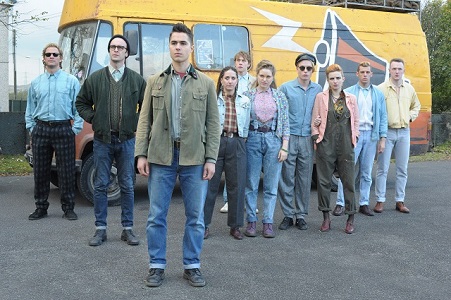Movie Info
Movie Info
- Director
- Matthew Warchus
- Run Time
- 2 hours
- Rating
- R
VP Content Ratings
- Violence
- 2/10
- Language
- 5/10
- Sex & Nudity
- 3/10
- Star Rating
Relevant Quotes
From now on, therefore, we regard no one from a human point of view…
If I wrote any more on this relief offering for the poor Christians, I’d be repeating myself. I know you’re on board and ready to go.

The 2007 Pride dealt with a group of black youth in Philadelphia gaining pride through their rigorous training as a swimming team. In this film with the same title, also based on real incidents about a group of society’s outsiders, the scene shifts to London and Wales. Director Matthew Warchus and writer Stephen Beresford focus upon a group of gay and lesbian Brits during the Margaret Thatcher era when shame rather than pride was the adjective associated with being gay. How this changes for this group and some of the Welsh miners whom they help is a delightful process to watch as the often-funny action unfolds on the screen.
Mark Ashton (Ben Schnetzer) is the unappointed leader of a group of lesbian and homosexual males who hang out at a gay bookstore in London. When he reads of the unequal struggle of striking coal miners in Wales, he sees that they also are outsiders, just as oppressed as he and his fellow gays. He suggests at a gathering that they take up an offering to send to the strikers. Most of the crowd refuse, one of them, bookstore owner Gethin (Andrew Scott), bitterly opposed because of terrible memories of being beaten up so often while growing up in Wales. His partner, however, theatrical actor Jonathan (Dominic West) responds positively, joining in the formation of The Lesbians and Gays Support the Miners (LGSM). So does teenager Joe (George MacKay), who must make up tales for his parents because he has not yet come out of “the closet.” After raising buckets of coins and wadded up bills, the group makes contact with miners in the South Wales mining town of Onllwyn.
Cliff (Bill Nighy), a member of the miner’s council, comes to London and speaks at a gay event. The audience is suspicious at first, but Cliff’s simple Thank You and admission that during their lonely battle against entrenched power it is good to discover they have friends, wins them over, resulting in even more donations.
A team of ten gays and lesbians, led by Mark, travel in a yellow-and-orange van to Onllwyn. A few of the townsfolk such as Hefina (Imelda Staunton), Dai (Paddy Considine), and Sian (Jessica Gunning) welcome the strange group, but others regard them as if they were tentacled creatures dropping in from Mars or Jupiter. In a series of scenes that are funny and tender, some stereotypes are put aside by those willing to let experience change them, whereas others refuse even to enter into any close encounter that might go against their prejudice. The latter called to my mind the words of the 1970 song by Ray Stevens “Everything Is Beautiful”—“ There is none so blind/That is he who will not see/We must not close our minds/We must let our thought be free.”
The ensemble of characters is so large that the filmmakers cannot do justice to all of them, though they do try. Gethin does agree to go back to his native Wales on their second visit, and, prodded by one of the council members, he does take the time to visit the mother he has not seen for over a decade and a half. Joe’s struggle with his parents over his sexual orientation also is handled well. Especially intriguing is Miners’ Council member Sian who emerges early on as an overweight housewife, mother, and member of the Council who strongly supports the gays. I am not sure, but I think it might be Mark who tells her what a fine mind she has, so she should not waste it, but try to go to college. The endnotes inform us that not only did she eventually go and graduate from college, but also even ran and became a Member of Parliament!
Although the film over simplifies the history of the events that took place over a year’s time, it is a good reminder of the troubled road that has been trod over the past 30 years. The miners and gays were divided among themselves, and when the Thatcher government cut off their government benefits and brought other pressures to bear, the former lost their strike. Much of gay support also diminished when the fear of HIV and AIDS devastating the gay community diverted their attention from helping others. (There is a sad endnote about one of the characters succumbing to AIDS.) And yet, there were small triumphs, one of them at the end of the film creating a lump in my throat: in the 1985 London Gay pride Parade we see leading the march a contingent of the Welsh miners holding aloft their union banner for all to behold, thus affirming their solidarity.
People of faith remain divided on the issue of gays and their rights, so while some are cheering the film, others will be refusing to see it. This is too bad, for although a movie is not likely to change someone’s mind*, even those against the gay life style might gain an understanding and appreciation of the humanity of gays and their anguish at what they regard as oppression by society. At my last parish a member told me that if the Presbyterians were ever to accept gays into leadership roles, he would resign his membership—and yet in the same conversation he spoke well of a mutual friend whom we both knew was gay. That person had a face and history of relationship with the member, so, although he remained opposed to gays as a group, he could accept one as a person. My father was that way in regard to a local African American, even though he was hostile to “the colored.” My dad would never have said to Sam’s face what he said to his white friends and us about African Americans.
Some teachable/preachable moments: 1. During the welcoming of the gays a burly miner crosses the gender boundary for the first time by going up and shaking one of their hands. 2. Jonathan does a Zorba-like dance at the miners’ hall, drawing forth admiration and inspiring many reluctant miners to join in the celebration. 3. Mark’s taking and using the epithet of a hostile newspaper headline “Perverts and Pits” meant to tar the miners (represented by “Pits”) by associating them with despised gays. He tells his friends, “You take it, and you own it,” thus reminding me of the way in which John Wesley took the putdown “Methodist” and ran with it.
Pride will be a questionable choice for many church members, but for those who agree with the filmmakers’ acceptance of gays as undeservedly oppressed by straight society, this is the film to see and discuss. Whether it is a social justice film, or one giving in to perversion, will depend on how you interpret a few passages in the Hebrew/Christian Scriptures. I found it deeply moving and inspiring, but then I also don’t believe in Scriptural prohibitions against women speaking in church, cutting their hair–nor would I want to re-institute stoning to death adulterers or believers who switch over to a different faith. Do we cling with the words of Scripture, or interpret them through the loving person whom we call The Word? (See John, ch. 1.)
*However, at one of my film presentations at a college years ago a young woman told me how Philadelphia impacted her. By her evangelical language I could tell from whence she was coming as she declared, “That movie showed me that my church was wrong on gays.” Talk about the power of film!
This film with a set of discussion questions will be in the Nov. 2014 issue of Visual Parables.

